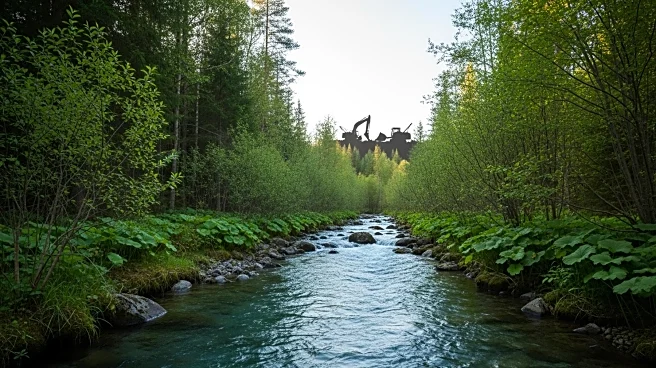What's Happening?
Green Light Metals is facing criticism from local residents in Wisconsin over its plans to expand metallic sulfide mining operations in Taylor County. The company believes there is over four tons of ore containing sulfides and gold at the Bend site. However,
concerns have been raised about the environmental impact, particularly the risk of acid mine drainage, which occurs when sulfides are exposed to air and water, potentially contaminating rivers and streams. Critics argue that the mining industry often promises economic benefits that primarily favor the companies involved, rather than the local communities. They suggest that alternatives such as recycling gold and copper should be considered to mitigate environmental damage.
Why It's Important?
The debate over mining in Wisconsin highlights the ongoing tension between economic development and environmental protection. Acid mine drainage poses a significant threat to local ecosystems and water sources, which could have long-term consequences for public health and the environment. The criticism reflects broader concerns about the sustainability of mining practices and the need for more environmentally friendly alternatives. The situation underscores the importance of balancing economic interests with the preservation of natural resources, which is crucial for the well-being of local communities.
What's Next?
Local residents and environmental advocates may push for the reinstatement of the Prove it First Mining Law, which was previously repealed. This law required mining companies to demonstrate that their operations would not harm the environment before proceeding. The outcome of this debate could influence future mining regulations in Wisconsin and potentially set a precedent for other states facing similar issues. Stakeholders, including political leaders and environmental groups, are likely to engage in discussions to address these concerns and explore sustainable solutions.
Beyond the Headlines
The controversy over mining in Wisconsin raises ethical questions about corporate responsibility and the prioritization of profit over environmental stewardship. It also highlights the cultural significance of preserving natural landscapes and water sources, which are integral to the identity and heritage of local communities. The situation may prompt broader discussions about the role of tourism as an alternative economic driver, emphasizing the value of natural beauty and ecological health over industrial exploitation.















